- About us
- Support the Gallery
- Venue hire
- Publications
- Research library
- Organisation chart
- Employment
- Contact us
- Make a booking
- Onsite programs
- Online programs
- School visit information
- Learning resources
- Little Darlings
- Professional learning
This work depicts the ceremonial practice of corroboree by the Awabakal Aboriginal peoples of Mulubinba (Newcastle) around 1818. Awabakal senior man Burigon, also known as Long Jack or King Jack (d. 1820), is the tall, smiling figure standing second from left. James Wallis, commandant of the Newcastle penal settlement, later said he remembered Burigon ‘with more kindly feelings than I do many of my own colour, kindred and nation’, and it has since been suggested that Wallis’s good relationship with Burigon facilitated the creation of the remarkable visual records of Mulubinba and the Awabakal dating from his tenure. It is thought, for instance, that Burigon accompanied convict and artist Joseph Lycett on his sketching expeditions, giving Lycett access to scenes that would ordinarily have been closed to non-Aboriginal people. Burigon was stabbed in the course of tracking two escaped convicts, John Kirkby and John Thompson, on 27 October 1820 and suffered in pain until his death some 10 days later. Kirby was convicted of his murder and was hanged on 18 December: the first white man ever convicted and executed for murdering an Aboriginal person under British law. Thompson, however, was acquitted.
Commissioned with funds from the Basil Bressler Bequest 2001
© eX de Medici
eX de Medici (age 42 in 2001)
Peter Garrett AM (age 48 in 2001)
Rob Hirst (age 46 in 2001)
Jim Moginie (age 45 in 2001)
Martin Rotsey (age 45 in 2001)
Dwayne Hillman (age 43 in 2001)
Basil P. Bressler (44 portraits supported)



On one level The Companion talks about the most famous and frontline Australians, but on another it tells us about ourselves.

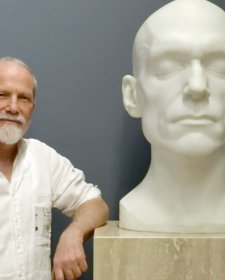
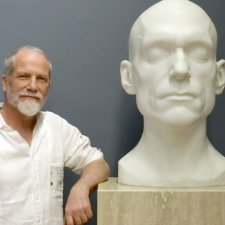
Sculptor Peter Schipperheyn talks about working with marble and his portrait of Peter Garrett.
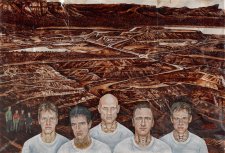
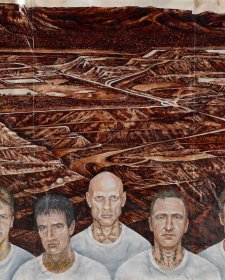
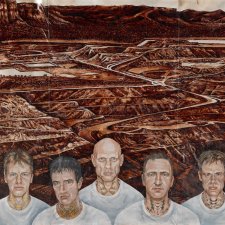
Magda Keaney explores the symbolism in eX de Medici's portrait of Midnight Oil.